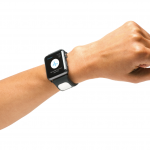Post-stroke rehabilitation treatment is also being boosted by a new device developed at Northwestern University and being tested at the Shirley Ryan AbilityLab, a Chicago research hospital. It is a Band-Aid® like device which can be applied to key areas such as the throat (left above, credit AbilityLab), chest, or limbs to send back information to doctors on how a patient in treatment post-discharge, especially at home, progresses. The sensors and platform measure heart activity, muscle movement, sleep quality, swallowing ability, and patterns of speech. Especially revolutionary is the monitoring of speech communication and swallowing, which are often impaired in stroke patients but hard to track once the patient is out of a facility. The team’s research was presented last week at the American Association for the Advancement of Science (AAAS) annual meeting. New Atlas. Hat tip to Toni Bunting.
Breaking news: AliveCor’s integration with Apple Watch – hugely impressive!
 AliveCor have today announced the Kardia Band which replaces the ordinary strap on an Apple Watch. Touch the band with your other hand and it records a one-lead ECG (EKG=US) that communicates with the Watch app, Kardia by AliveCor. The Atrial Fibrillation (AF) Detector then uses an algorithm to instantly detect and inform the wearer of the presence of AF, the most common cardiac arrhythmia and a leading cause of stroke. Other ‘detectors’ look at the ECG to determine normal heart rate and rhythm or if you should retake an ECG so physicians receive only the highest quality recordings.
AliveCor have today announced the Kardia Band which replaces the ordinary strap on an Apple Watch. Touch the band with your other hand and it records a one-lead ECG (EKG=US) that communicates with the Watch app, Kardia by AliveCor. The Atrial Fibrillation (AF) Detector then uses an algorithm to instantly detect and inform the wearer of the presence of AF, the most common cardiac arrhythmia and a leading cause of stroke. Other ‘detectors’ look at the ECG to determine normal heart rate and rhythm or if you should retake an ECG so physicians receive only the highest quality recordings.
Users can also record voice memos on their Apple Watch to accompany each ECG that give doctors and caregivers a clearer picture of what was happening at the time of the recording — describing symptoms such as palpitations or external factors like caffeine intake. Kardia also integrates seamlessly with Apple’s Health app to include ECG data with steps and calorie intake to provide richer, personal analysis over time.
A short note at the end indicates that the FDA-cleared AliveCor Mobile ECG, best known for snapping on to an iPhone but works on Android smartphones as well, has been rebranded as Kardia Mobile to establish a product family.
Most impressive.
In the US, the Kardia Band is pending 510k clearance and is not currently for sale. Plans for the UK have not been formally announced but anticipated soon. AliveCor release.







Most Recent Comments